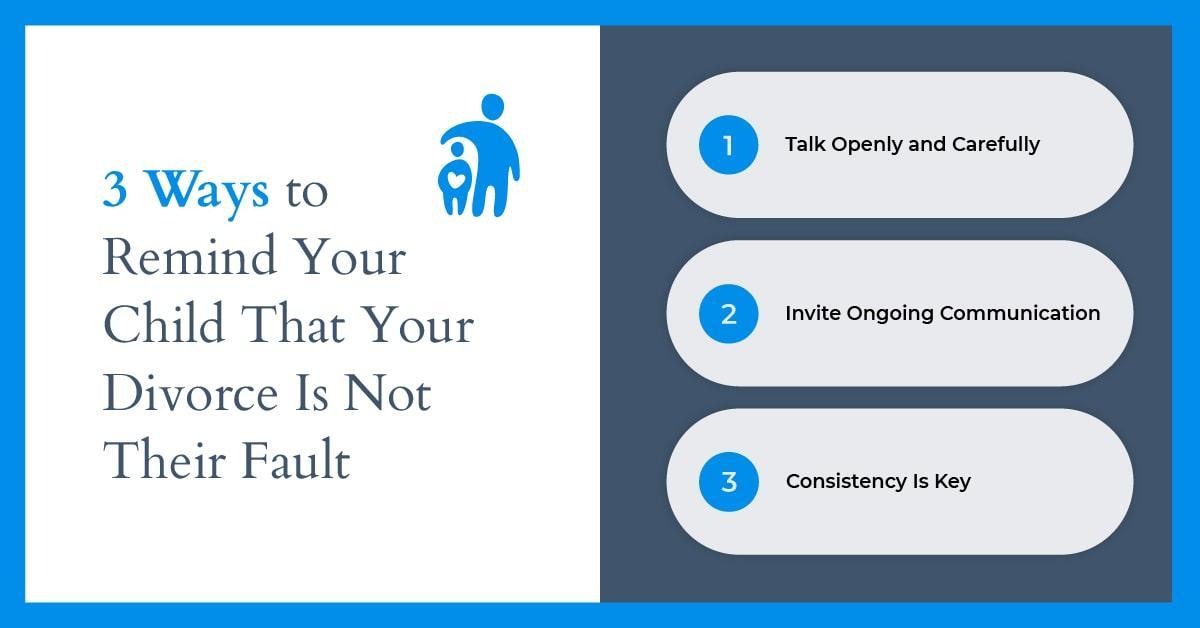Recent Blog Posts
3 Ways to Remind Your Child That Your Divorce is Not Their Fault
 It is normal and common for a child to feel as if they are to blame when their parents get divorced. Many children struggle with self-blame when their parents begin to separate. They may reflect on times they have misbehaved and wonder whether it had anything to do with your decision to get divorced. Almost no parent would say that their child is the reason for their divorce. Reminding your child that they are not to blame in your divorce can help your child cope with the divorce in a more healthy way. It can be difficult for children to adjust to spending time with their parents in different households or only seeing one parent most or all of the time. Parents should take steps to protect their children’s emotional health during this time. Helping them understand that nothing happening is their fault can go a long way towards raising an emotionally healthy child after divorce.
It is normal and common for a child to feel as if they are to blame when their parents get divorced. Many children struggle with self-blame when their parents begin to separate. They may reflect on times they have misbehaved and wonder whether it had anything to do with your decision to get divorced. Almost no parent would say that their child is the reason for their divorce. Reminding your child that they are not to blame in your divorce can help your child cope with the divorce in a more healthy way. It can be difficult for children to adjust to spending time with their parents in different households or only seeing one parent most or all of the time. Parents should take steps to protect their children’s emotional health during this time. Helping them understand that nothing happening is their fault can go a long way towards raising an emotionally healthy child after divorce.
Helping Your Child Understand That They Are Not at Fault
Divorce Options for Spouses of Substance Abusers
 Substance abuse is an enormous social problem almost everywhere in the country. The large proportion of Americans who struggle with substance abuse means that illicit drugs are widely available and easily accessible. Many people are able to recover from addiction and go on to have normal, productive lives. However, if your spouse is addicted to drugs and has not put forth the effort to get clean, you may find that your marriage has become more of a burden than a boon. You are not obligated to stay and continue trying to take care of a person who will not do the work needed to take care of themselves. Divorce may be the best option for protecting yourself and any children involved. Unfortunately, getting a divorce from a substance abuser can be difficult. It is important to have skilled legal representation as you begin the often-difficult task of divorcing your addicted spouse.
Substance abuse is an enormous social problem almost everywhere in the country. The large proportion of Americans who struggle with substance abuse means that illicit drugs are widely available and easily accessible. Many people are able to recover from addiction and go on to have normal, productive lives. However, if your spouse is addicted to drugs and has not put forth the effort to get clean, you may find that your marriage has become more of a burden than a boon. You are not obligated to stay and continue trying to take care of a person who will not do the work needed to take care of themselves. Divorce may be the best option for protecting yourself and any children involved. Unfortunately, getting a divorce from a substance abuser can be difficult. It is important to have skilled legal representation as you begin the often-difficult task of divorcing your addicted spouse.
Can Children in Kane County Choose Which Parent to Live With?
 When parents are getting a divorce or separating, one of the most contentious issues is often who will have more parenting time to spend with the children. Few parents are willing to give up any amount of time they could spend with their child in a shared custody arrangement. While Illinois has largely dispensed with the term “primary custody,” it does often work out so that one parent’s home is the child’s primary residence, while the other parent enjoys shorter amounts of parenting time. Determining which parent will have the children most of the time can be difficult for many families. One option that many parents choose is to enlist the help of a mediator and work out an arrangement by mutual agreement. However, in cases where this is not possible or practical for any reason, it typically falls to the court to make that decision. While a child’s input on the matter is important, it is not generally the deciding factor.
When parents are getting a divorce or separating, one of the most contentious issues is often who will have more parenting time to spend with the children. Few parents are willing to give up any amount of time they could spend with their child in a shared custody arrangement. While Illinois has largely dispensed with the term “primary custody,” it does often work out so that one parent’s home is the child’s primary residence, while the other parent enjoys shorter amounts of parenting time. Determining which parent will have the children most of the time can be difficult for many families. One option that many parents choose is to enlist the help of a mediator and work out an arrangement by mutual agreement. However, in cases where this is not possible or practical for any reason, it typically falls to the court to make that decision. While a child’s input on the matter is important, it is not generally the deciding factor.
If I am Already Married, is it Too Late for a Prenuptial Agreement?
 Many engaged couples feel that prenuptial agreements are unromantic. It can certainly feel less-than-hopeful when you and the person you are about to marry must discuss who keeps what in the event that you divorce later. During your engagement, you were likely focused on the details of your wedding and your dream of living happily ever after with your soon-to-be spouse. Once you are married, you may begin to think about whether you should have made a prenuptial agreement. Many married people believe that they have missed their chance to reach an agreement governing important issues. Fortunately, it is not too late to create what is called a postnuptial agreement. Both you and your spouse should be represented by an attorney when you begin the process of creating a postnuptial agreement.
Many engaged couples feel that prenuptial agreements are unromantic. It can certainly feel less-than-hopeful when you and the person you are about to marry must discuss who keeps what in the event that you divorce later. During your engagement, you were likely focused on the details of your wedding and your dream of living happily ever after with your soon-to-be spouse. Once you are married, you may begin to think about whether you should have made a prenuptial agreement. Many married people believe that they have missed their chance to reach an agreement governing important issues. Fortunately, it is not too late to create what is called a postnuptial agreement. Both you and your spouse should be represented by an attorney when you begin the process of creating a postnuptial agreement.
Why Should My Spouse and I Make a Postnuptial Agreement?
What Should an Illinois Parenting Plan Include?
 When parents with at least one child in common get divorced in Illinois and will share custody, they must file what is called a parenting plan. Parenting plans may also be needed for parents who were never married, but are separating. A parenting plan is more than a visitation schedule, and more than a child support order. Parenting plans include a wide variety of information and agreements or court orders. In many cases, parenting plans are developed by mutual agreement of the parents outside of court. These plans are of very high importance to both the parents involved and the children involved, as they make quite a few provisions regarding how co-parenting will work after the divorce is finalized. It is important to be represented by an attorney before you begin to discuss future co-parenting plans with your soon-to-be ex-spouse. An attorney can help you understand what rights you as a parent have and what rights your children have in this situation.
When parents with at least one child in common get divorced in Illinois and will share custody, they must file what is called a parenting plan. Parenting plans may also be needed for parents who were never married, but are separating. A parenting plan is more than a visitation schedule, and more than a child support order. Parenting plans include a wide variety of information and agreements or court orders. In many cases, parenting plans are developed by mutual agreement of the parents outside of court. These plans are of very high importance to both the parents involved and the children involved, as they make quite a few provisions regarding how co-parenting will work after the divorce is finalized. It is important to be represented by an attorney before you begin to discuss future co-parenting plans with your soon-to-be ex-spouse. An attorney can help you understand what rights you as a parent have and what rights your children have in this situation.
What is a Voluntary Acknowledgement of Paternity?
 In Illinois, there are several paths to establishing that you are the father of your child. If you are married to the mother around the time the baby is born, you will likely be declared the father automatically. If this is the case, you do not need to take any further steps to become a legal father as well as a biological one. However, if you are not married to the mother, you will need to take additional steps. In some cases, you may even need to go to court to have yourself declared the legal parent of your child. A court can order a DNA test if the mother denies that you are the child’s birth father. However, the easiest way to establish legal parentage is usually by signing a voluntary acknowledgement of paternity. If you are unsure about your own path to legal parentage, it is best to speak with an attorney about what your options are.
In Illinois, there are several paths to establishing that you are the father of your child. If you are married to the mother around the time the baby is born, you will likely be declared the father automatically. If this is the case, you do not need to take any further steps to become a legal father as well as a biological one. However, if you are not married to the mother, you will need to take additional steps. In some cases, you may even need to go to court to have yourself declared the legal parent of your child. A court can order a DNA test if the mother denies that you are the child’s birth father. However, the easiest way to establish legal parentage is usually by signing a voluntary acknowledgement of paternity. If you are unsure about your own path to legal parentage, it is best to speak with an attorney about what your options are.
Understanding a Voluntary Acknowledgement of Paternity
In nearly all contexts, Illinois law uses the term “parentage” instead of “paternity.” You may hear this document referred to as either a “voluntary acknowledgement of parentage” or a “voluntary acknowledgement of paternity.” This document is generally used by unmarried parents who want their child’s two legal parents established easily.
4 Myths About Prenuptial Agreements Debunked
 While most legal sources will strongly recommend using a prenuptial (or postnuptial) agreement in nearly all cases, there are quite a few negative things said about them. When you are engaged or newly married, you are likely to hear a lot of unsolicited advice pertaining to prenuptial agreements. Some of your friends may believe that these agreements are unromantic, while others may tell you that they are absolutely necessary in order to protect your personal assets in the event of a future divorce. It can be difficult to tell what is true about prenuptial agreements and what is misinformation. Before you begin working out an agreement with your soon-to-be spouse, it is best to speak with an attorney. An attorney can answer any questions you have about how prenuptial agreements work and what they should include.
While most legal sources will strongly recommend using a prenuptial (or postnuptial) agreement in nearly all cases, there are quite a few negative things said about them. When you are engaged or newly married, you are likely to hear a lot of unsolicited advice pertaining to prenuptial agreements. Some of your friends may believe that these agreements are unromantic, while others may tell you that they are absolutely necessary in order to protect your personal assets in the event of a future divorce. It can be difficult to tell what is true about prenuptial agreements and what is misinformation. Before you begin working out an agreement with your soon-to-be spouse, it is best to speak with an attorney. An attorney can answer any questions you have about how prenuptial agreements work and what they should include.
Common Misinformation About Prenuptial Agreements
The Importance and Purpose of Premarital Agreements
 It is crucial to understand the importance of a prenuptial agreement in marriage, including its purpose, benefits, and drawbacks before making a decision. Even if you do not plan on getting one, it's helpful to have knowledge about it to be prepared in advance.
It is crucial to understand the importance of a prenuptial agreement in marriage, including its purpose, benefits, and drawbacks before making a decision. Even if you do not plan on getting one, it's helpful to have knowledge about it to be prepared in advance.
Understanding Premarital Agreements
A premarital agreement, commonly known as a "prenup," is a legal agreement that two indiviuals sign before getting married or entering a civil partnership. Prenuptial agreements have been used for a significant amount of time, but they have become increasingly popular in recent years.
Premarital agreements can be helpful for many couples, but there are misconceptions that they are only for the rich or signify a lack of trust. Actually, a premarital agreement is a sensible measure that couples can take before tying the knot.
Why People Choose Premarital Agreements
There are numerous reasons why a couple might opt for a premarital agreement. These can include protecting individual assets, clarifying financial rights and responsibilities during marriage, and streamlining the divorce process should it occur. Far from indicating a lack of trust, these agreements can foster open and honest communication about financial matters, helping to strengthen the relationship.
What Happens in a Divorce Deposition?
 In every court case, the parties have the right to discovery, where they can gather evidence that is in the possession of the other party. In addition to document requests, they can also personally question the other party and witnesses in a deposition. This proceeding can be crucial to your case, and it is essential that you are prepared. Your Wheaton divorce attorney would be in the deposition to defend you.
In every court case, the parties have the right to discovery, where they can gather evidence that is in the possession of the other party. In addition to document requests, they can also personally question the other party and witnesses in a deposition. This proceeding can be crucial to your case, and it is essential that you are prepared. Your Wheaton divorce attorney would be in the deposition to defend you.
A Deposition Means Answering a Lot of Questions
Opposing counsel have a legal right to ask you questions, and they will pose quite a few of them during the course of the deposition. This proceeding will involve a series of questions, where the other attorney is attempting to gather information. The attorney may show you evidence and ask you questions about it, or they may ask a long series of questions. So long as these questions follow the proper rules (i.e, they are relevant, non-argumentative, non-repetitive, etc), you will need to answer them.
Which Profession Has the Highest Divorce Rate?
 There are variations in divorce rates among different professions. A recent study revealed that gaming managers–individuals who manage casinos–and bartenders bear the brunt of this reality, with a staggering divorce rate of over 50%. Working long hours outside conventional business hours can significantly strain a relationship, leading to its ultimate dissolution. In this blog post, we will explore the specifics of getting a divorce in Illinois, with a focus on professions that are particularly susceptible to high-risk situations.
There are variations in divorce rates among different professions. A recent study revealed that gaming managers–individuals who manage casinos–and bartenders bear the brunt of this reality, with a staggering divorce rate of over 50%. Working long hours outside conventional business hours can significantly strain a relationship, leading to its ultimate dissolution. In this blog post, we will explore the specifics of getting a divorce in Illinois, with a focus on professions that are particularly susceptible to high-risk situations.
Illinois Divorce Laws: No-Fault Grounds
Illinois updated their divorce laws in January 2016. Only "irreconcilable differences" is now a valid reason for divorce, which replaced previous reasons like abuse or adultery. Couples in Illinois who desire divorce must now provide evidence that their marriage cannot be mended due to their differences and there is no chance of reconciliation.












